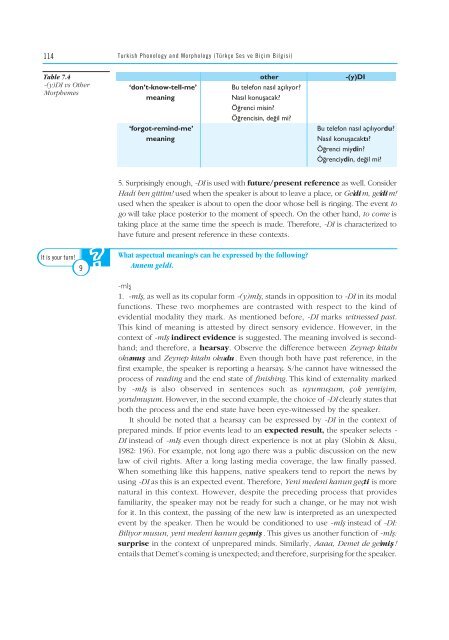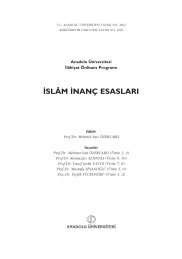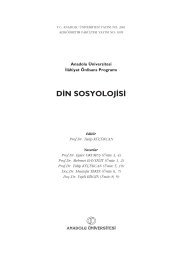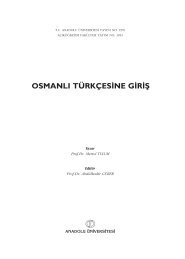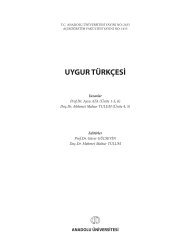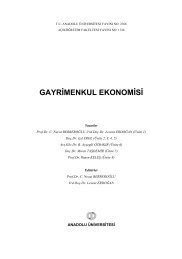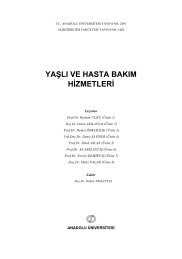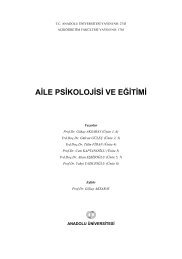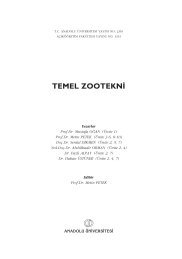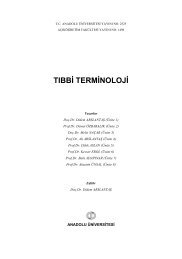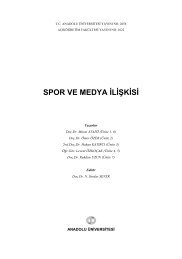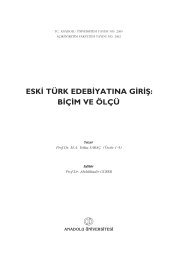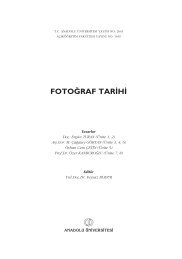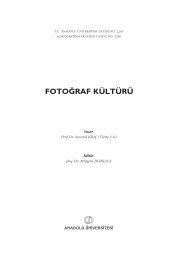turkish phonology and morphology (türkçe ses ve b‹ç‹mb‹lg‹s‹)
turkish phonology and morphology (türkçe ses ve b‹ç‹mb‹lg‹s‹)
turkish phonology and morphology (türkçe ses ve b‹ç‹mb‹lg‹s‹)
You also want an ePaper? Increase the reach of your titles
YUMPU automatically turns print PDFs into web optimized ePapers that Google loves.
1 1<br />
It is your turn!<br />
It is your turn!<br />
2 2<br />
It 114 is your turn!<br />
Turkish Phonology It is your <strong>and</strong> turn! Morphology (Türkçe Ses <strong>ve</strong> Biçim Bilgisi)<br />
3 3<br />
Table 7.4<br />
other -(y)DI<br />
-(y)DI vs Other<br />
It is your turn!<br />
Morphemes<br />
4<br />
‘don’t-know-tell-me’ It is your turn!<br />
meaning 4<br />
Bu telefon nas›l aç›l›yor?<br />
Nas›l konuflacak?<br />
Ö¤renci misin?<br />
It is your turn!<br />
5<br />
It is your turn!<br />
‘forgot-remind-me’<br />
5<br />
meaning<br />
Ö¤rencisin, de¤il mi?<br />
Bu telefon nas›l aç›l›yordu?<br />
Nas›l konuflacakt›?<br />
Ö¤renci miydin?<br />
It is your turn!<br />
It is your turn!<br />
Ö¤renciydin, de¤il mi?<br />
6 6<br />
It is your turn!<br />
7<br />
5. Surprisingly enough, -DI is used with future/present reference as well. Consider<br />
It is your turn!<br />
Hadi ben gittim! used when the speaker is about to lea<strong>ve</strong> a place, or Geldim, geldim!<br />
used when 7 the speaker is about to open the door whose bell is ringing. The e<strong>ve</strong>nt to<br />
go will take place posterior to the moment of speech. On the other h<strong>and</strong>, to come is<br />
It is your turn!<br />
taking place It is at your the turn! same time the speech is made. Therefore, -DI is characterized to<br />
8 ha<strong>ve</strong> future 8 <strong>and</strong> present reference in these contexts.<br />
It is your turn!<br />
What aspectual It is your meaning/s turn! can be expressed by the following?<br />
9 Annem 9 geldi.<br />
-mIfl<br />
It is your turn!<br />
It is your turn!<br />
1. -mIfl, as well as its copular form -(y)mIfl, st<strong>and</strong>s in opposition to -DI in its modal<br />
10<br />
10<br />
functions. These two morphemes are contrasted with respect to the kind of<br />
evidential modality they mark. As mentioned before, -DI marks witnessed past.<br />
It is your turn!<br />
This kind It of is meaning your turn! is attested by direct sensory evidence. Howe<strong>ve</strong>r, in the<br />
11 context of 11-mIfl<br />
indirect evidence is suggested. The meaning invol<strong>ve</strong>d is secondh<strong>and</strong>;<br />
<strong>and</strong> therefore, a hearsay. Obser<strong>ve</strong> the difference between Zeynep kitab›<br />
It is your turn!<br />
okumufl <strong>and</strong> It is Zeynep your turn! kitab› okudu. E<strong>ve</strong>n though both ha<strong>ve</strong> past reference, in the<br />
12<br />
first example,<br />
12<br />
the speaker is reporting a hearsay. S/he cannot ha<strong>ve</strong> witnessed the<br />
process of reading <strong>and</strong> the end state of finishing. This kind of externality marked<br />
by -mIfl is also obser<strong>ve</strong>d in sentences such as uyumuflum, çok yemiflim,<br />
It is your turn!<br />
It is your turn!<br />
yorulmuflum. Howe<strong>ve</strong>r, in the second example, the choice of -DI clearly states that<br />
13<br />
both the<br />
13<br />
process <strong>and</strong> the end state ha<strong>ve</strong> been eye-witnessed by the speaker.<br />
It should be noted that a hearsay can be expressed by -DI in the context of<br />
prepared minds. If prior e<strong>ve</strong>nts lead to an expected result, the speaker selects -<br />
DI instead of -mIfl e<strong>ve</strong>n though direct experience is not at play (Slobin & Aksu,<br />
1982: 196). For example, not long ago there was a public discussion on the new<br />
law of civil rights. After a long lasting media co<strong>ve</strong>rage, the law finally passed.<br />
When something like this happens, nati<strong>ve</strong> speakers tend to report the news by<br />
using -DI as this is an expected e<strong>ve</strong>nt. Therefore, Yeni medeni kanun geçti is more<br />
natural in this context. Howe<strong>ve</strong>r, despite the preceding process that provides<br />
familiarity, the speaker may not be ready for such a change, or he may not wish<br />
for it. In this context, the passing of the new law is interpreted as an unexpected<br />
e<strong>ve</strong>nt by the speaker. Then he would be conditioned to use -mIfl instead of -DI:<br />
Biliyor musun, yeni medeni kanun geçmifl. This gi<strong>ve</strong>s us another function of -mIfl:<br />
surprise in the context of unprepared minds. Similarly, Aaaa, Demet de gelmifl!<br />
entails that Demet’s coming is unexpected; <strong>and</strong> therefore, surprising for the speaker.


